Fop or Foppishness in Man of Mode
The Man of Mode is a restoration comedy by George Etherege (1636-1692), which was first performed in March 1676. The play explores Dorimant as the principle character of the play; on the other hand, Sir Fopling Flutter was the 'Fop' main character of the play. Moreover, the title of the play also "Sir Fopling Flutter."
In the play, Sir Fopling Flutter is a new comer to London, he is an excessive manner, artificial, and fashionable man. He is a very proud man, and often lacks in wisdom and wit. He is often fallen for Mrs. Loveit for loving.
In this play, Medley the friend of Dorimant, tells that Sir Fop is one of the important critics in Paris. In this regard, Dorimant, the protagonist of the play, expresses, “I wanted a fop to lay to her charge, and this is as pat as may be." From the context, It's said that Sir Fop is so funniest and vanity character in the contemporary age of Restoration period.
On the other hand, the leaving beloved of Dorimant, Mrs. Loveit, is showing her interest to attract to Sir Fopling Flutter. Moreover, Bellinda recounts his mistreatment of Mrs. Loveit. Emilia confirms another quarrel, fueled by jealousy of Sir Fopling.
In a time, we have seen that Lady Townley expresses for Sir Fop's charcteristics Mrs. Loveit is going to see keen interest on Sir Fop. In the play, Sir Fopling Flutter often expresses as the man and woman becuse of his fashion clothes and behaviors.

In Spite of being a man, Sir Fop reveals his interest to wear a woman type of wears and styles. The word "fop" in the Restoration comedy exposes to a vain and this type of character shows often to the point of absurdity. The "Foppishness" is not only for using the character but also the term expresses as satirical tool used to critique the shallow and hedonistic culture of the Restoration period.
Etherege has kept Sir Fop as the epitome of foppery or amenity decoration, to make an opposite him with the other characters to visit the themes of vanity, self-obsession, and the performative nature of social life in the contemporary period of England.
Sir Fop gives more values to dresses of fancy style, not in the charms and imaginable maturity. The main characters like Dorimant, Belinda, and Medley wanted to satire on Sir Fop. It is quoted that "Bellinda criticizes his persecution of Loveit but agrees to follow his instructions."
Sir Fop enters and embraces, "Dorimant, praising him for retaining the Parisian air. Dorimant values staying in fashion, and Sir Fopling suggests they become intimate friends, as one needs a confidant for pleasures." Here, Dorimant satirzes to Sir Fop in a manipulative way, which makes more ridicule to this situation.
In a lunatic behaviour of Sir Fop, he has apolozies and acknowledges to Emilia as for her beauty and charms. On the other hand, Sir Fop takes his pardon from Medley for his delaying to reach here. In the current time, Sir Fop and Medley discuss about the Parsian and English languages' differences. Otherly, Lady Townley and Emilia praise about the gloves and overall appearances of Sir Fop.
Sir Fop has asked to Dorimant a about lady for his gallantry, and Dorimant targets to Mrs. loveit as the perfect and can be combined woman to him. Sir Fop has invited to Mrs, loveit to join them eagerly for displaying their beauty and appearances in fashion.
Medley comments, "Sir Fopling's character, and calling him a fine 'mettled coxcomb', while Dorimant describes him as brisk and insipid." The 'Foppishness' in "The Man of Mode" is a source of humor of human psychology, but it also serves as a critique of Restoration society. In this context, Emilia expresses that, "despite their disdain, many people consider Sir Fopling a wit."
The play also shows that the "foppishnbess" is not outed from Sir Fop, but aslo it is unleashed from the other characters of the play. In Medley, we have often seen the 'Fop' type of behaviour.
In this play, Sir Fop is organically is slected as the 'Fop' of the play, by Etherege. In most of the cases, Fop characters become proud at his behaviour and appearances.
Etherege’s portrayal reminds us that while fashions may change something , the human preoccupation with appearances remains a timeless subject of satire.